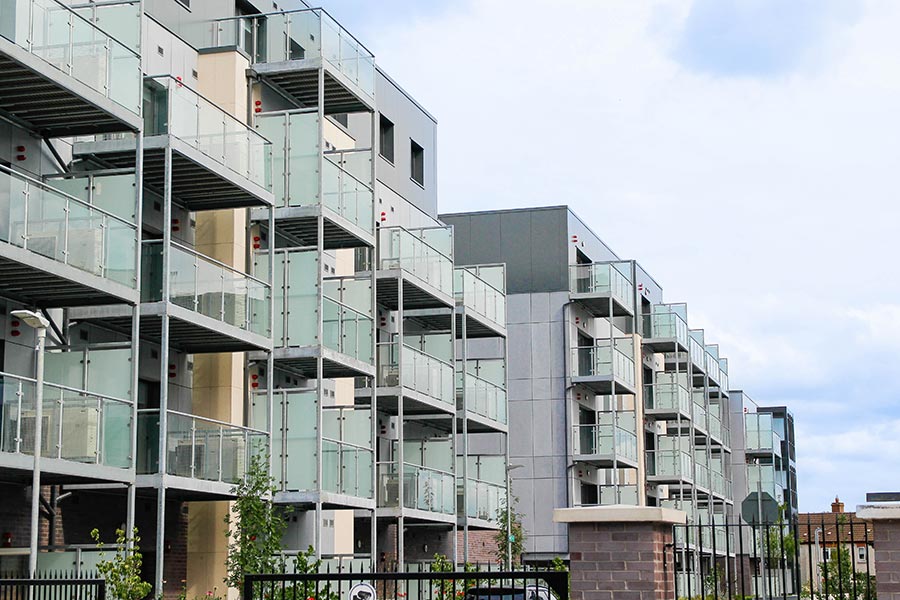Foreign investment in apartment building has plummeted sparking fresh fears in Government that housing completions will not improve this year, writes Craig Hughes.
The latest data provided to Finance Minister Paschal Donohoe show planning permissions for apartment buildings plunged by a third, 33%, in the first three quarters of 2024, compared to the same period in 2023.
The drop has caused alarm in Government, as applications are viewed as a “barometer” of the level of foreign investment in the property market.
In a housing update for Mr Donohoe earlier this month, finance officials warned that the drop in investment is now resulting in fewer new homes being delivered, which will make it “very difficult” for the Government to meet its targets.
One Cabinet minister said investment “has fallen off a cliff” and that there now needs to be a “frank and honest conversation” with the public about “what is actually achievable in housing this year”.
In their report, officials wrote: “The retrenchment of institutional investment in the private rental sector (PRS) over recent years is now being borne out in the completions figures.
“It will be very difficult to meet official supply targets without a significant increase in such investment.”
This comes as a new Daft.ie report revealed nationwide average market rents have hit almost €2,000 a month – up by 43% since the pandemic – with only around 2,300 properties available for rent across the country.
The Government has set a target of delivering an average of 50,000 new homes annually over the next five years, up from 33,000 per year.
Taoiseach Micheál Martin has been accused of “misleading” the public on home delivery after the Central Statistics Office revealed just 30,300 homes were built last year, despite repeated claims it would be 40,000.
Last week, the Irish Home Builders’ Association (IHBA) said that there is “palpable concern” residential construction will not rise this year.
“Expediting housing supply needs to be treated as an emergency and funded accordingly,” it said.
The shortfall in housing last year has sent shockwaves through the Coalition, sparking divisions on how to tackle the problem.
The Government is currently examining ways in which it can stimulate the market and attract further investment.
However, Mr Donohoe has firmly ruled out the return to tax breaks for developers that fuelled that Celtic Tiger property crash as mooted by the Taoiseach.
A review of the Rent Pressure Zones (RPZs), which cap annual rent increases at 2% in designated areas, is already under way with an expectation that they will be replaced by a “reference rental” system recommended by the independent Housing Commission.
This would mean limits regarding how much a landlord could charge would be related to factors such as location and size of property.
An analysis by the Department of Finance last year on the availability, composition and flow of finance for residential development highlighted RPZs as something foreign investors wanted dropped from the Irish market.
The report found that €20bn is needed annually in order to build 50,000 homes each year, with €16.9bn of this coming from institutional investors who told the Government that RPZs need to go if it wants their capital.
The investors told the department that the RPZs were not making the Irish rental sector attractive enough to invest in.
A report by Daft.ie yesterday found a clear two-tier impact for properties within RPZs and new developments not subject to the controls, with study author Professor Ronan Lyons stating that the findings illustrated that having some of the strictest rent controls in the world has not solved issues in the housing market.
“Rents for movers have increased by almost half since rent controls were tightened in 2021, while rents for ‘stayers’ have risen by just 7% in the same time,” he said.
Mr Lyons said the current situation regarding rent controls was “clearly unsustainable”.
Senior officials from the Department of Housing and the Department of Enterprise will join executives from the Ireland Strategic Investment Fund, the IDA and the Irish property industry at a major international property conference in France next month as they try to lure more foreign investment.

A Government spokesman said: “The State is making an unprecedented investment in housing, but the only way we can deliver homes at the scale we need is by also attracting private investment to the market.
“The Government is focused on attracting additional investment while protecting renters.”
He said the conference in France “offers an excellent opportunity for representatives from Ireland to speak directly to the key decision makers across European real estate”.
Sinn Féin housing spokesman Eoin Ó Broin said the Government needs to increase the levels of funding in housing while also making it easier for small and medium-sized builders.
“If Government worked with SME developers – to allow them to get on site more quickly to build more good-quality homes – they would fill any gap that may or may not be there from institutional investors,” he said.











